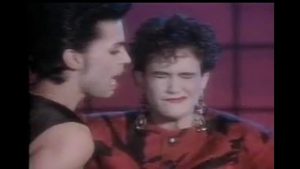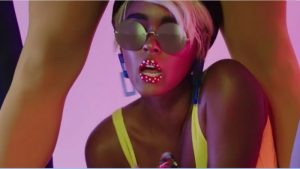Still from Prince’s “Kiss” Music Video, YouTube.com
Prince
As previously stated, in American popular culture, specifically in music, it is most common for men to speak and sing in a low range. In Prince’s “Kiss,” from his 1987 album Parade, Prince challenges these notions of gender norms, as he sings in his falsetto range throughout the song. Though Prince was certainly not the first Black or male artist to sing in falsetto, and though this was not his first time singing in falsetto on a song, his strategic placement of it in this song is important in context of other facets of the song, video, and album. Prince was, and is still, known for many of his rock songs, such as the iconic “Purple Rain,” which contained strong, low-range vocals with a reverb effect. In “Kiss,” the lead and background vocals completely lack any reverb as they “create a compact, ‘hi-definition’ proximate space that is almost devoid of spatial qualities” (Brøvig-Hanssen and Danielsen 2013, 76). In this song, Prince departs from a traditional rock sound and creates a very intimate aura induced by his falsetto range and neat, tight vocal inflection during the verses. On most of his albums, such as Prince, 1999, and Purple Rain, Prince tended to sing in a lower range, though singing in falsetto occasionally. However, in “Kiss,” not only does he sing in falsetto with vocal inflections practically the entire time, but in the second half of the song, he takes the falsetto to an extreme and is screaming the lyrics by the end of the song. Challenging gender norms with his vocals was not enough for Prince. He needed to make a much more impactful statement, which led to him making this vocal choice throughout the song, and especially at the end of the song.
Still from Janelle Monáe’s “Make Me Feel” Music Video, Baeblemusic.com
Janelle Monáe
Modeled similarly after Prince’s vocal tactics on “Kiss,” Janelle Monáe also uses bold vocal maneuvers on “Make Me Feel.” On her song, Monáe sings in a blatant sensual tone, singing in a mid-to-low range with a smooth vocal timbre. By doing this, she expresses femininity, sexuality, and agency. Though she does not sing in as high of a vocal range as Prince, she does employ similar vocal inflections. In many parts of the song, Monáe even goes as far as to seemingly moan some of the lyrics. As she is controlling her own pleasure, she is deliberately suggesting the importance of agency in sexuality for not only just women, but specifically Black women. While Prince used the vocal inflections in the verses of his song, Monáe places them within the pre-chorus of her song. This similar use but different placement signals how Monáe is paying homage to Prince and his challenging of gender and sexuality norms, but also how she alters it to critique 21st century expectations of physical femininity and sexuality of Black women. Something that is very interesting is how Monáe recreates the intense, almost difficult to understand, recitation of lyrics at the end. Just as Prince, Monáe sings in her highest range of the song towards the end of the song as she repeats certain lines of the chorus. These intense vocal maneuvers mirror Prince’s maneuvers but also indicate the importance of Black women paving their own way and having their own agency not only in music, but also in life.

